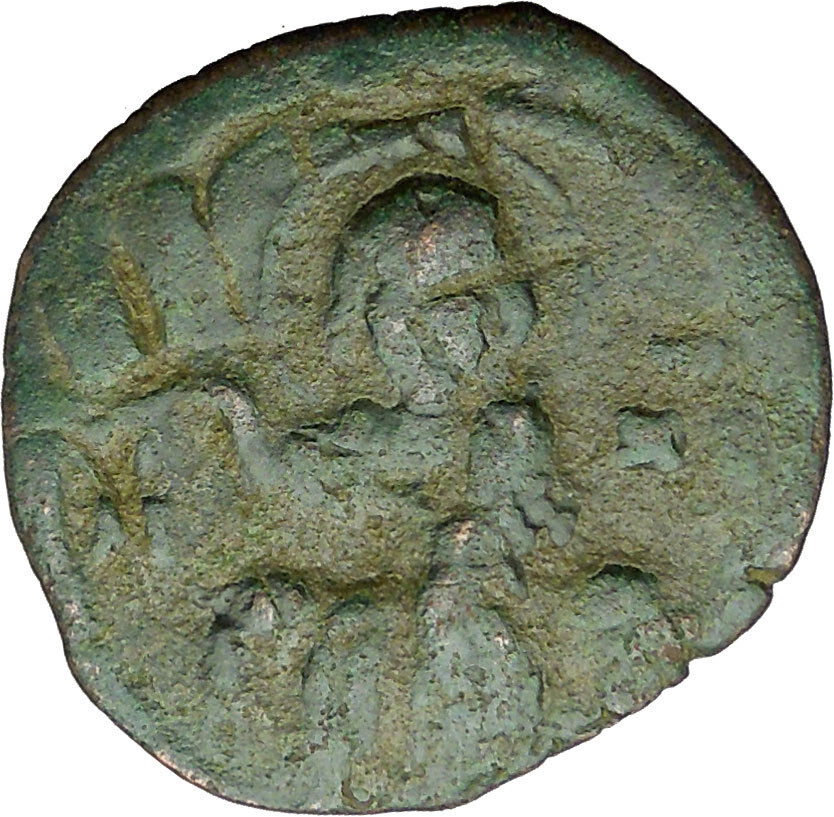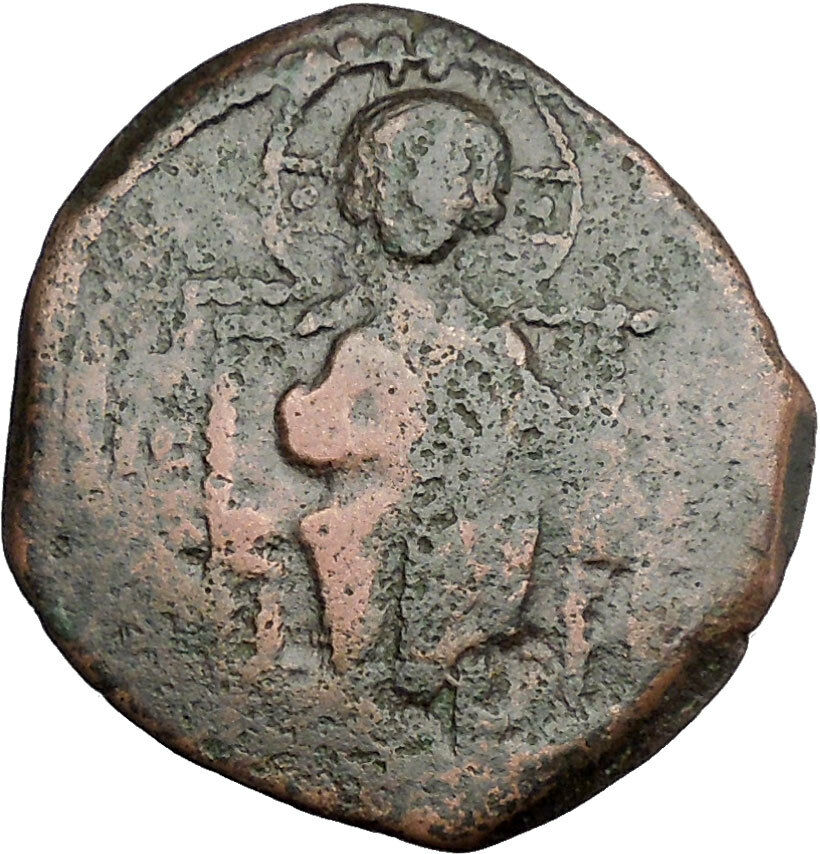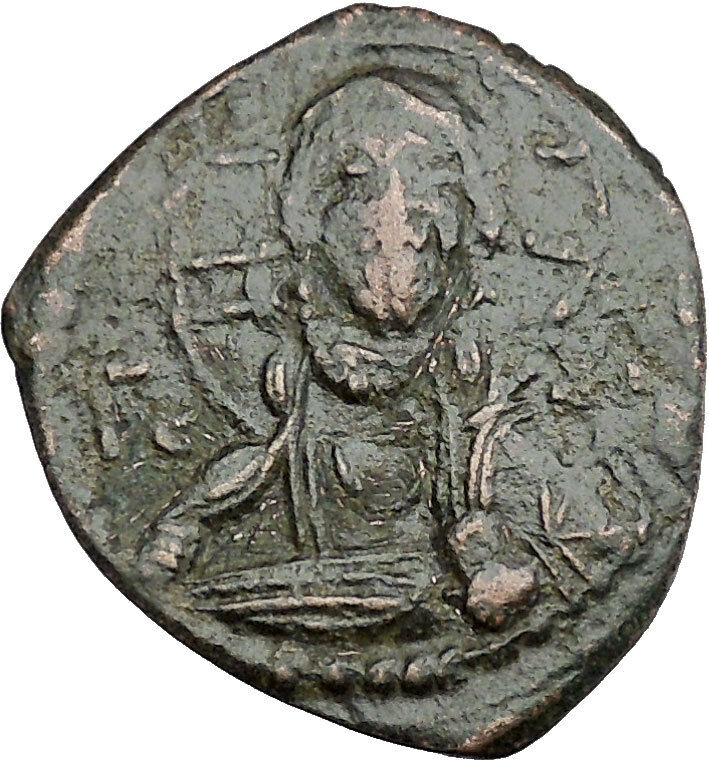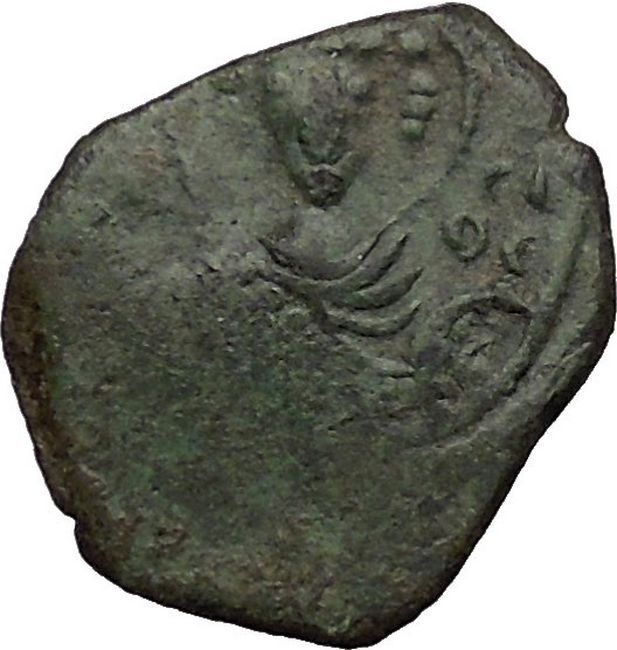|
Byzantine Empire
Nicephorus III Botaneiates –
Emperor: March 24,
1078 –
April 4, 1081 A.D.
Bronze Follis 25mm (4.54 grams) Constantinople mint: 1078-1081 A.D.
Reference:
Sear 1888
Three-quarter length figure of
Jesus Christ standing facing, wearing nimbus crown, pallium and colobium, and raising right hand in benediction; in left hand, book
of Gospels; in field to left, IC over large star; to right, XC over large star.
Cross
, with globule at each extremity; at center, circle containing star of
eight rays; in the angles, C – Φ / N – Δ.
For more than a century, the production of Follis denomination Byzantine coins
had religious Christian motifs which included included
Jesus Christ, and even Virgin Mary. These coins were designed to honor Christ
and recognize the subservient role of the Byzantine emperor, with many of the
reverse inscriptions translating to “Jesus Christ King of Kings” and “May Jesus
Christ Conquer”. The Follis denomination coins were the largest bronze
denomination coins issued by the Byzantine empire, and their large size, along
with the Christian motif make them a popular coin type for collectors. Read more and see examples of these coins by reading the
JESUS CHRIST
Anonymous Class A-N Byzantine Follis Coins Reference.
Click here to see all the Jesus Christ Anonymous Follis coins for sale
Click here to see all the Jesus Christ Follis coins for sale
Click here to see all coins bearing Jesus Christ or related available for sale.
You are bidding on the exact item pictured,
provided with a Certificate of Authenticity and Lifetime Guarantee of
Authenticity.
Jesus of Nazareth (c. 5 BC/BCE – c. 30 AD/CE), also
referred to as Jesus Christ or simply Jesus, is the central figure
of
Christianity. Most
Christian denominations
venerate him as
God the
Son
incarnated
and believe that he
rose from the dead
after being
crucified
.
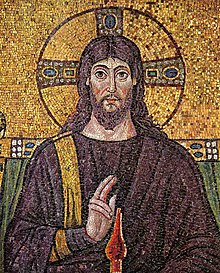
The
principal sources of information regarding Jesus are the four
canonical gospels, and most
critical scholars
find them, at least the
Synoptic Gospels, useful for reconstructing Jesus’ life and
teachings. Some scholars believe apocryphal texts such as the
Gospel of Thomas and the
Gospel according to the Hebrews
are also
relevant
.
Most critical historians agree that Jesus was a
Jew
who was regarded as a teacher and
healer
, that he
was baptized
by
John the Baptist, and
was crucified
in
Jerusalem
on the orders of the
Roman Prefect
Judaea,
Pontius Pilate, on the charge of
sedition
against the Roman Empire
. Critical Biblical scholars and
historians have offered competing descriptions of Jesus as a self-described
Messiah,
as the leader of an apocalyptic movement, as an itinerant sage, as a charismatic
healer, and as the founder of an independent religious movement. Most
contemporary scholars of the
Historical Jesus consider him to have been an independent,
charismatic founder of a Jewish restoration movement, anticipating an imminent
apocalypse. Other prominent scholars, however, contend that Jesus’ “Kingdom
of God” meant radical personal and social transformation instead of a
future apocalypse.
Christians traditionally believe that Jesus was
born of a virgin
:529–32
performed
miracles
,:358–59
founded
the Church
,
rose from the dead
, and
ascended
into
heaven,:616–20
from which he
will return
.:1091–109
Most Christian scholars today present Jesus as the awaited Messiah promised in
the
Old Testament and as God, arguing that he fulfilled many Messianic
prophecies of the Old Testament
. The majority of Christians
worship Jesus as the incarnation of God the Son, one of three divine persons of
a reject Trinitarianism
Trinity, wholly or partly,
believing it to be non-scriptural.
Judaism
rejects
assertions that Jesus was the awaited
Messiah, arguing that he did not fulfill the
Messianic prophecies
in the
Tanakh.
In Islam,
Jesus (Arabic:
عيسى, commonly transliterated as
Isa
) is considered one of
God’s
important
prophets
, a bringer of
scripture
, and the product of a virgin birth;
but did not experience a crucifixion. Islam and the
Baha’i Faith
use the title “Messiah” for Jesus,
but do not teach that he was God incarnate.
Nikephoros III Botaneiates, Latinized as Nicephorus III Botaniates
(Greek:
Νικηφόρος Βοτανειάτης, c. 1002[1]
– 10 December 1081) was
Byzantine
emperor
from 1078 to 1081. He belonged to a
family which claimed descent from the Byzantine
Phokas family
.
Early career
Nikephoros Botaneiates had served as general from the reign of
Constantine IX
. Drawn to politics, he had been
an active participant in the uprising that brought
Isaac I
to the throne in 1057,[2]
including a prominent role in the
Battle of Petroe
. Although considered a
competent general, he had suffered a number of humiliating setbacks throughout
his career. In 1064, he, together with
Basil Apokapes
,
doux of
Paradounavon
, defended the
Balkan
frontiers against the invading
Oghuz Turks
, but was defeated and suffered the
humiliation of being taken captive. However, the outbreak of an epidemic soon
began decimating the Turks and the prisoners were recovered, while the survivors
were quickly recruited in the
Byzantine army
.
In 1067, he had been considered as a possible husband for the empress
Eudokia Makrembolitissa
, widowed wife of
Constantine X, but she eventually set her heart of
Romanos IV Diogenes
.[3]
Excluded from Romanos’s campaign at
Manzikert
, he retired to his estates in
Anatolia
. Eventually, under
Michael VII Doukas
, he became
strategos
of the
Anatolic theme
and commander of the troops in
Asia Minor
. Here he participated in the
shambolic acts that crippled the empire’s eastern provinces, including his
strategic retreat when
Caesar John Doukas
was confronting
Norman
mercenary rebels, resulting in the
humiliating defeat of the Byzantine army, and the capture of John Doukas.
In 1078 he revolted against Michael VII and his finance minister
Nikephoritzes
, and with the support of the
Seljuk Turks
who provided him with valuable
troops he marched upon
Nicaea
, where he proclaimed himself emperor. In
the face of another rebellious general,
Nikephoros Bryennios
, his election was ratified
by the aristocracy and clergy, while Michael VII abdicated and became a monk. On
March 24, 1078, Nikephoros III Botaneiates entered Constantinople in triumph and
was crowned by
Patriarch Kosmas I of Constantinople
. With the
help of his general
Alexios Komnenos
, he
defeated
Bryennios and other rivals, but failed
to clear the invading Turks out of
Asia Minor
.
Reign
To solidify his position, on the death of his second wife Nikephoros III
sought to marry
Eudokia Makrembolitissa
, the mother of
Michael VII and the widow of
Constantine X
and Romanos IV. This plan was
undermined by the
Caesar
John Doukas
, and Nikephoros instead married
Maria of Alania
. They married in contravention
of church canons, as Maria was still at that time, the wife of Michael VII who
had entered the monastery of Stoudios. Nevertheless, Nikephoros did not
recognize the succession rights of Maria’s son Constantine Doukas, while his
plan to promote his worthless nephew Synadenos as co-emperor exposed him to the
suspicion and plots of the surviving portions of the Doukas faction at court.
Nikephoros’ administration did not win him much support, as his favored
courtiers alienated much of the older court bureaucracy and failed to stop the
devaluation of the Byzantine currency.
Almost immediately, the uprisings began. Apart from the discontent of the
Byzantine aristocracy, several
Armenian
princes in Asia Minor attempted to
establish their independence from the empire. Two
Paulician
leaders launched their own rebellion
in Thrace
, in a brutal religious conflict that was
not easily suppressed. Consequently, Nikephoros became increasingly dependent on
the support of Alexios Komnenos, who successfully defeated the rebellion of
Nikephoros Basilakes
in the Balkans (1079) and
was charged with containing that of
Nikephoros Melissenos
in Anatolia (1080). The
Byzantine Empire also faced foreign invasion, as the
Norman
Duke
Robert Guiscard
of Apulia declared war under
the pretext of defending the rights of young
Constantine Doukas
, who had been engaged to
Robert’s daughter Helena. As Alexios was entrusted with substantial armed forces
to combat the impending Norman invasion, the Doukas faction, led by the Caesar
John, conspired to overthrow Nikephoros and replace him with Alexios. Failing to
secure the support of either the
Seljuk Turks
or Nikephoros Melissenos (both
parties being his traditional enemies), Nikephoros III was forced to abdicate in
favour of the Komnenos dynasty, to which he was connected through the engagement
of his grandson to the daughter of Alexios’s older brother Manuel. The deposed
emperor retired into the
monastery that he had endowed
, and died later
the same year.
|






